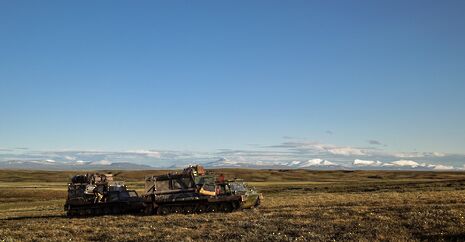Letters from Siberia
Beth Bhargava traces literature’s shifting perceptions of an area of Russia best-known for its dark past

Russia, for many Brits, is Siberia, and the image of an empty wasteland of snow, bones and sorrow understandably captivates the popular imagination. Needless to say, this is far from the full story. Even the most cursory survey of the rich literature produced in and on Siberia will offer the reader alternative understandings of this space. This piece will explore ideas of Siberian specificity, and the ambivalent ways in which it has been depicted.
Siberia has long been understood as a place of exile and displacement. Though most people associate such ideas exclusively with the Soviet era and the horrors of the GULAG system, this history reaches back far further. Under the Tsars, Siberia was both a refuge from, and a tool of, autocratic power. It was a haven for persecuted minorities, such as the dissenting Old Believers, and a prison for generations of rebels against autocracy.
Herzen depicts Siberia as a sinister playground for power and vice
By the mid-19th century, exiled authors already sensed that they existed within a long and worthy tradition. Early Russian Socialist Alexander Herzen wrote extensively about Siberia and the experience of exile in his memoir My Past and Thoughts. He describes how the ideals and decisions of his youth were strongly influenced by the stories of a previous generation of exiled rebels: the Decembrists of 1825. The history within which he situates himself is one dominated by female heroism. He devotes great attention to the stories of the wives of the 1825 exiles, stressing their bravery and moral commitment in refusing to repudiate their ties to their husbands and opting to follow them into exile. He takes great care to point out that knowledge of this female bravery is limited to a “very few”. The story Herzen tells about Siberia is one which emphasises the importance of forgotten and marginalised histories. It is a notion that should be born in mind by any contemporary working on Russia or Siberia.
In describing his own exile, Herzen depicts Siberia as a sinister playground for power and vice – a recurring theme in later works on the subject. Having been banished to Perm in the 1830s, he later wrote of the tyranny of the Governor of Perm, arguing that “a Governor’s power increases by arithmetical progression with the distance from Petersburg, but increases by geometrical progression in provinces like Perm” where a type of “frontier” mentality results in power becoming intensely concentrated. It is suggested that the very wilderness, unknowability and ungovernability of this region paradoxically renders it vulnerable to the construction and abuse of power, and the cruel success of untrammelled projections of an individual’s will.
Dostoevsky equates Siberian exile with both deprivation and epiphanic redemption
Nevertheless, Herzen’s account is not universally negative. Perhaps jarringly, he can describe his experiences in terms which bring it close to the narrative of a bildungsroman: “From the nursery I had passed straight into the lecture-room, and from the lecture-room to … an intimate world of theories and dreams, without contact with practical life … contact with life was beginning only now and here, by the ridge of the Ural Mountains”. The experience of Siberian exile is equated with the attainment of a form of full-adulthood and, more than this, the attainment of an ironically amorphous understanding of the “reality” of everyday “practical” life.
Herzen is far from alone in presenting his exile in such ambivalent terms. Dostoevsky, too, equates Siberian exile with both deprivation and epiphanic redemption in novels such as Crime and Punishment and his semi-autobiographical Notes from the House of the Dead. The works of Vladimir Korolenko are less well-known but no less worth exploring. Yet another relatively privileged exiled rebel who processed his experiences through writing, Korolenko’s fiction can be read as a search for community and commonality with the poor of the region. He often literally places both narrator and reader inside the peasant imagination. This is seen most clearly in the short-story Makar’s Dream: A Christmas Tale (available online here), in which a drunken peasant is confronted with a view of an afterlife which retains the landscape and objects of village-life but turns its morality on its head. The tale concludes with a display of understanding and justice for the downtrodden, whose sins are presented as the result of their poverty.
Siberia may be a place in which accepted boundaries of morality and humanity are breached, but this can occur in a positive as well as a negative sense. In a dream world of remarkable vividness, social norms are abandoned and justice is delivered. Siberia is at once Utopia and Dystopia – dual concepts which I will examine in my final article in this series.
 News / Report suggests Cambridge the hardest place to get a first in the country23 January 2026
News / Report suggests Cambridge the hardest place to get a first in the country23 January 2026 News / Reform candidate retracts claim of being Cambridge alum 26 January 2026
News / Reform candidate retracts claim of being Cambridge alum 26 January 2026 News / Cambridge ranks in the top ten for every subject area in 202623 January 2026
News / Cambridge ranks in the top ten for every subject area in 202623 January 2026 Comment / Cambridge has already become complacent on class23 January 2026
Comment / Cambridge has already become complacent on class23 January 2026 News / Palestine activists project slogans onto John’s24 January 2026
News / Palestine activists project slogans onto John’s24 January 2026









